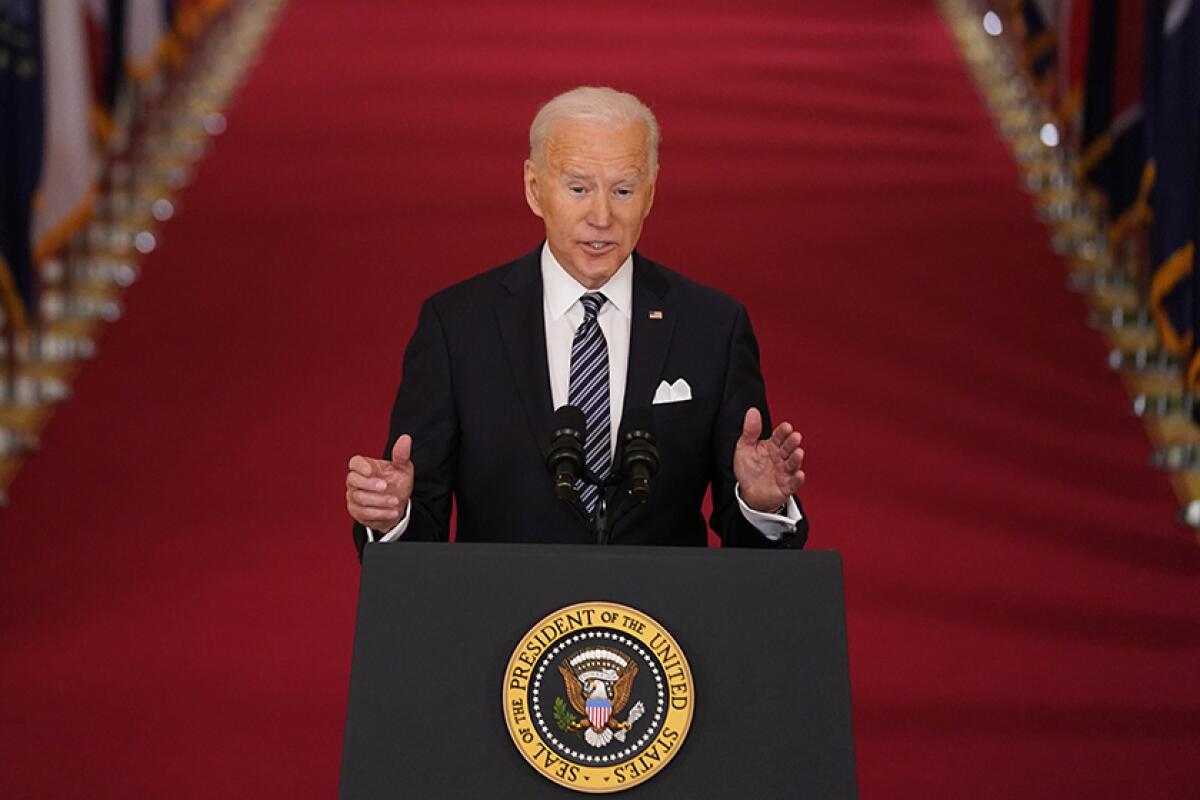Editorial: The Justice Department rightly tightens protections for journalists

The Justice Department’s damaged reputation suffered further last month, when the Washington Post revealed that the department in 2020 had moved to obtain telephone records from Post reporters who’d broken stories three years earlier about Russia’s role in the 2016 U.S. election.
That’s why it was welcome news when the department announced that it won’t use “compulsory legal process” in leak investigations to obtain information from members of the news media.
For the record:
10:19 a.m. July 20, 2021This editorial has been corrected to note that the Justice Department reportedly decided to obtain telephone records of three Washington Post reporters in 2020, not 2019.
Protecting the confidentiality of newsgathering isn’t a concession to a special interest. Society as a whole benefits when reporters are able to aggressively investigate official wrongdoing or incompetence, even if that sometimes means obtaining government information not authorized for public release.
Yet questions remain not only about the investigations that prompted this change of policy, but also about the White House’s role in the department’s decision to change course. Atty. Gen. Merrick Garland, who will be testifying Wednesday before a Senate subcommittee, should be prepared to address both subjects.
Last month the department acknowledged that during the Trump administration it had acquired telephone records of reporters who work for the Washington Post and the phone and email records of a reporter for CNN — two news outlets repeatedly criticized by the president. Last week the New York Times, another frequent target of President Trump, reported that the department had secretly seized phone records from 2017 related to four of its reporters and obtained a court order to obtain logs of reporters’ emails.
Google, the newspaper’s email provider, resisted supplying the latter information — and in March the Justice Department obtained a judicial gag order preventing New York Times executives from publicizing the matter. A court eventually lifted the order.
Trump’s Justice Department was hardly the first to target reporters in leak investigations. Most recently, the George W. Bush and Obama administrations did so as well. But in 2013, then-Atty. Gen. Eric H. Holder Jr. tightened the guidelines governing the acquisition of information from journalists.
The guidelines say that prosecutors must notify news organizations before seeking records of contacts between reporters and their sources unless the attorney general determines that notification would threaten the integrity of the investigation, risk grave harm to national security or present an imminent risk of death or serious bodily injury.
Given Trump’s attempts to politicize the Justice Department, Congress and the public need assurances that these guidelines were followed. But the fact that the department was apparently able to exploit exceptions in the guidelines strengthens the case for the department’s new, more protective policy.
It’s notable, too, that the gag order preventing New York Times executives from publicly discussing the case involving Google was obtained by the Justice Department during the Biden administration. Presidential Press Secretary Jen Psaki said that the White House had been unaware of the order.
The Justice Department’s change of policy followed a statement by Biden that it was “simply, simply wrong” for the DOJ to gain access to journalists’ phone and email records. The president said that he “would not let that happen” in the future.
Psaki suggested that Biden’s comments didn’t amount to an attempt to intervene in criminal investigations. Rather, she said, issuing subpoenas for the records of reporters in leak investigations “is not consistent with the president’s policy direction to the department.” The distinction between a general policy established by the president and the handling of particular cases is an important one. But it’s vital in light of Trump’s politicization of the Justice Department that “policy” guidance from the president never be deployed to influence particular cases.
Finally, although the new Justice Department policy is welcome, the best way to protect newsgathering from intrusion by the government is for Congress to follow the example of many states and enact a shield law protecting journalists’ confidential sources. Then, protections for reporters — and the public interest in coverage of the people’s business — wouldn’t depend on transitory decisions by a particular administration.
More to Read
A cure for the common opinion
Get thought-provoking perspectives with our weekly newsletter.
You may occasionally receive promotional content from the Los Angeles Times.










